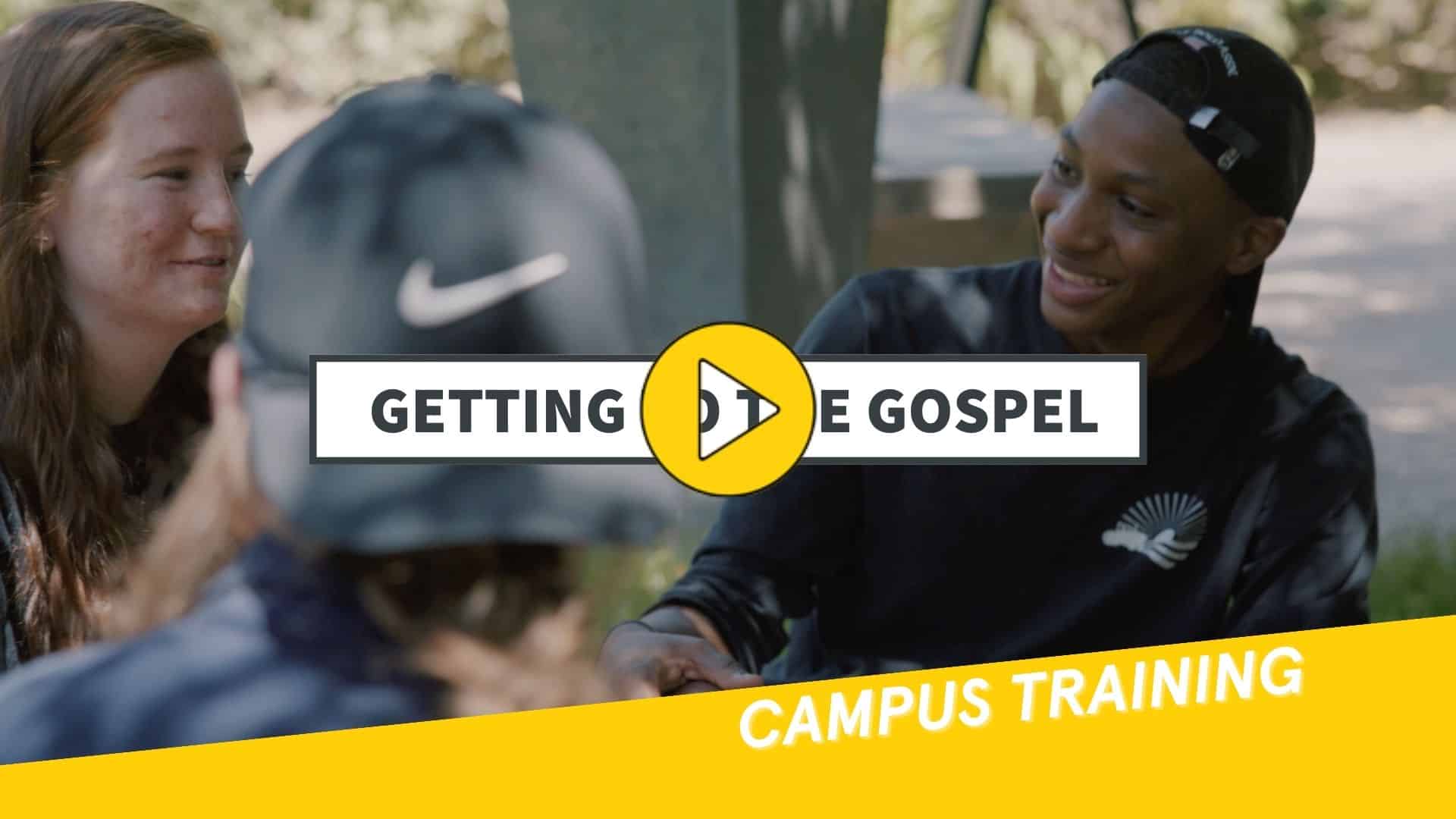Dr. Bill Bright, Cru’s co-founder, said that “successful witnessing is taking the initiative in the power of the Holy Spirit and leaving the results to God.” In Cru, we believe that Christians are called to make the first move toward not-yet-believers around us. It is not always easy.
However, we can learn a lot from Jesus. He took the initiative with the people around Him and opened up the door for spiritual conversations.
Throughout His ministry, Jesus used engaging questions to challenge people’s expectations and soften their hearts. Jesus was an expert in asking the right questions in order to dive through surface-level discussion and reach heart level.
Starting spiritual conversations the way Jesus did is a habit many want to develop but find nearly impossible to maintain.
Why is it so hard to take those first steps? Below are some ways you can prepare yourself for these incredible conversations.
Barriers to Boldness
Can you relate to this situation? You are talking with a friend, they share something vulnerable with you, and you end up just staring at them, tongue-tied!
You might be able to get out a comment, but soon after, you realize you have missed a golden opportunity for the gospel. You have known this person for a long time, and that only seems to make it harder to talk about the real things that matter in life. Why is that?
This is due to a few different reasons:
- spiritual shyness
- a lack of reliance on the Spirit
- fear of rejection
Overcome Fears
We all have different levels of fear or concern when it comes to talking to others about Jesus. When we look at the way Jesus talks to people about Himself, we soon see that He has the antidote to our personal barriers to boldness.
- Jesus was casual.
In John 4, He started a conversation with a Samaritan woman over a simple drink of water. Once she responded, He used His listening skills to take the conversation into deeper things, eternal life, and her personal felt needs. - Jesus modeled complete reliance on the Holy Spirit.
He relied on the Holy Spirit to keep Him from sin (Luke 4). He got alone with God often (Luke 5:16, Mark 1:35). The best part is that He pours the Holy Spirit into those who believe in Him (Acts 2:33), so we too can have access to God’s power through the same Spirit! - Jesus taught us to fear God, not humans.
He shows us God’s special care for us (Matthew 10:28-31) and consistently demonstrated a concern for people’s eternal destiny above their present comfort (Mark 10:17-23). He taught that whatever loss we have in this world- relationship, money, comfort, anything- will be repaid exponentially in heaven.
When we fully grasp these three things, we will see that it is not up to our presentation to change the hearts of people. It’s up to God. We are just starting the conversation.
Jesus modeled complete reliance on the Holy Spirit and gave us the gift of the Spirit.
Avoid Christian Slang
Once we start a conversation, one way to help remove some barriers that others might have is to make sure that we are both speaking the same language.
We have started a podcast as one of our digital ministry strategies. Since this podcast is geared toward high school students, we have to be careful to watch our usage of “Christianese,” those words that only Christians seem to use. If we do use a technical term that most “not-yet-Christians” do not know, we take time to explain what we mean.
- Instead of “sanctification” → say “becoming more like Jesus”
- Instead of “sin” → say “bad things we do”
- Instead of “testimony” → say “my spiritual journey”
- Instead of “fellowship” → say “community”
It is hard to communicate without Christian jargon because we are so used to speaking about our faith using inside language! We can humbly drop the insider “Christianese” in conversations because we do not want to risk going over someone’s head (making them feel like an outsider) when we try to approach spiritual topics.
Once again we look to Jesus. He often used fishing terms and agricultural language to communicate spiritual truths. This might make Jesus’ parables seem confusing. However, to His audience who fished and farmed all day, these parables made total sense! He spoke to them in a language they would understand.
Furthermore, Jesus strongly cautioned His disciples against using many words or praying in order to impress people with their vocabulary (Matthew 6:5-8). His message resonated with those who were “poor in spirit,” the people who did not think they had life figured out.
When we care about people the way Jesus did, we change the words we use to better communicate with others.
Retreat, React, or Respond
Relaxing and clearly communicating are important in our interactions with others. But what happens if someone does not relax with us? What if they react poorly when we try to share our faith?
Let’s look again at John 4. In verses 10-14, Jesus turned His conversation with the Samaritan woman from a request for water to an offer for living water- real satisfaction. He turned the conversation to spiritual issues.
At first, the woman wanted to challenge Christ’s claim to have the answers to life (verses 11-12): “How can you know the truth? No one knows for sure.” This is not unusual. Some people may respond this way, even after we have established a friendship.
There are three ways we could respond to someone who questions us as the Samaritan woman questioned Jesus.
- We could back off, retreat, and give up, trying to avoid offending someone.
- We could react or argue, trying to win a debate or impress people with what we know.
- We could continue to engage, inviting them to consider spiritual truth.
It is important to not get into arguments with people. 2 Timothy 2:23-26 calls us to “not be quarrelsome but kind to everyone, able to teach, patiently enduring evil, correcting opponents with gentleness.” Instead of fighting hard for our stance, we can take a posture of humility, kindness, and patience. We can simply let the truth, not our argument, be compelling.
The results are in God’s hands. “God may perhaps grant them repentance leading to a knowledge of the truth, and they may come to their senses and escape from the snare of the devil, after being captured by him to do his will” (verses 25-26).
We do not need to argue for God, but that does not mean we retreat either. Some people are unhappy and dissatisfied with life. This can make them argumentative, just like the Samaritan woman. In the text, it appears that she did not seem to want Jesus to back off and leave her alone. People who challenge us seldom do.
In fact, if Jesus had given up and walked away, it’s likely the Samaritan woman would have been disappointed. “Well, I guess He Himself is not that convinced.” Instead, Jesus kept His focus on her real need, not her reactions, and it helped her trust Him.
If we humbly engage with people who disagree with us, we will be treating them with dignity and trusting God with the results at the same time.
It is important to not get into arguments with people with whom we initiate.
Action Steps for Your Journey
As we wrap up, here are some suggestions that will help you take the initiative:
- Pray specifically for opportunities to share Christ.
Pray for your friends and students by name. If God brings a specific person to mind, shoot them a text right then, asking to meet up. - Look for opportunities.
If you have asked God for an opportunity to share, then expect it. Your friend may ask a question, express a personal need, or give an opinion, hoping you will respond. God is in control. Take a step of faith. Care about your friend. - Create opportunities.
When people were not coming to Jesus, He went to them. This can be the most important and exciting part of your ministry. Create opportunities by setting up a special time to eat, grab coffee, or do something outdoors on a nice day. Be very honest as to why you would like to get together. Explain that, sometime, you would love to hear about their spiritual journey and share about yours. - Consider the immense importance of someone knowing Christ.
Jesus did the single most loving act in the history of the universe on the cross. Ask God to give you a heart of compassion to share the love of Christ. These Scripture verses will help: Matthew 9:36-39; Romans 10:13-15; 1 Timothy 2:1-4; 2 Corinthians 4:16 – 5:10. - Do not be afraid of failure.
The results are up to God. There is no pressure to share everything that you know about the gospel all at once. Start with sharing a piece of God’s love that connects well with them. - Teamwork.
Try pairing up with a Christian friend to pray together for those with whom you want to share (Matthew 18:19). Create opportunities together for team evangelism (Luke 10:1). Share this article with another believer who wants to share their faith, and talk through it together.
By Faith, Break Down the Barriers
For sharing to become a way of life, we need to be thinking and planning ahead and focusing our attention and concern on those around us who do not know our Lord. The more we concern ourselves with the needs of others, the more natural it will be to share Christ.
By faith, we can break down the “dividing walls of hostility” (Ephesians 2:14) in our lives, since Jesus already has. After you have shared this article with your friend, pray for a few people to initiate with, and trust God with the results.
“When you awaken each morning, thank the Lord Jesus for living within you and ask Him to use your lips to speak of His love and forgiveness at every opportunity throughout the day.” – Dr. Bill Bright









